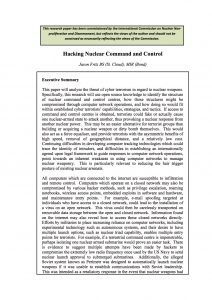Are the UK’s Trident Nuclear Weapons Vulnerable to Cyberattacks? (ITProPortal): A recent article by Mark Wilson which appeared in ItProPortal indicates that Des Browne, the former UK defense secretary believes that the Trident nuclear weapons are susceptible and could be rendered useless in a coordinated cyberattack. The article also indicates that the US had previously reported that US defenses and those of other NATO allies might not withstand a coordinated and sophisticated cyberattack. Browne, who is now the vice-chair of the Nuclear Threat Initiative says an inability to identify and mitigate cyber vulnerabilities could result in the nuclear deterrent being unavailable should the day come when it is actually needed, according to the article. Fortunately, Franklin Miller, a former White House defense policy official, believes the US nuclear system is impervious to cyberattack, according to the article. In the article, Miller states that if our nuclear command and control (“C&C”) system used the internet then this would be a very dire warning but Miller indicates that there is no issue since the Nuclear C&C system is air-gapped and not connected to the internet.
My Opinion:
While worrisome, is this really a big deal? With the amount of nuclear weapons available and the strategic alliances that have been formed, how many nuclear weapons would have to actually remain operable in order to maintain the mutually-assured-destruction (“MAD”) deterrence between the countries currently in the nuclear club? Unless of course there exists the possibility that rather than rendering the nuclear system inoperable during a cyberattack a cyberattack could somehow allow outside control of a nuclear weapon. That is certainly a far more worrisome scenario. For instance, it is suspected that the Russian nuclear C&C system (Perimetr) was designed to initiate a launch in the event that communication links were lost. One can only hope that such a system would leverage ultra low frequency (ULF) such as is used by the US Navy and which has proven difficult to successfully attack. However, the thought that a loss in a communication link could potentially initiate the launch of nuclear weapons is enough for one to consider that this vulnerability should be assessed and addressed.
Additionally, the comments by Franklin Miller are not very reassuring. Attacks on air-gapped systems are not really novel and have been successful in the past (e.g. Iranian Nuclear Facilities and Stuxnet). Furthermore, the fact that the same government that oversaw the exfiltration of over 20 million personnel records from the Office of Personnel Management (OPM) is in charge of cybersecurity for our nuclear arsenal is not exactly reassuring. See the article below for an interesting (if somewhat dated) read on this.




Leave a Reply